24 Signs of Anger Issues in a Man
Anger is a natural human emotion, but when it becomes a frequent or intense response, it can lead to serious issues, especially in men.
While everyone gets angry from time to time, some men struggle with anger issues that affect their relationships, workplace, and overall well-being.
Recognizing the signs of anger issues in a man is crucial for addressing the problem before it escalates.
In the United States, anger issues among men are more common than you might think. Studies show that around 7.8% of men in the U.S. struggle with some form of anger management problem.
This can result in frequent irritability and verbal outbursts to physical aggression or passive-aggressive behavior. These signs are often red flags that shouldn’t be ignored.
Understanding the signs of anger in men can help those affected take steps toward healthier emotional management.
By addressing these signs early on, men can learn to manage their anger more effectively, improving their lives and the lives of those around them.
24 Signs of Anger Issues in a Man
Anger issues in men can manifest in many ways, often impacting their personal and professional lives. While everyone experiences anger occasionally, the signs of deeper issues are usually more frequent and intense.
When anger becomes a regular response, it can damage relationships, career opportunities, and overall well-being.
Recognizing the signs is the first step toward managing anger healthily. These signs include frequent irritability, blaming others for problems, and physical aggression.
Understanding these indicators can help you or someone you care about address the underlying causes of anger and seek the appropriate help.
Let’s explore some of the most common signs of anger issues in men.
1. Blaming
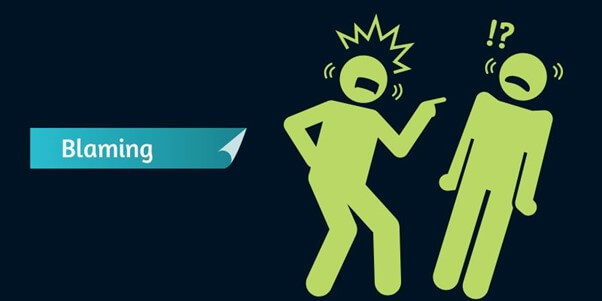
One of the common signs of anger issues in a man is the tendency to blame others for his problems or failures.
Instead of taking responsibility for his actions, a man with anger might lash out and accuse others of being the cause of his frustrations. This behavior is triggered by an inability to process and manage his emotions effectively.
Blaming can damage relationships, as it creates an environment of mistrust and resentment. Over time, this pattern of behavior can lead to isolation, as others may distance themselves to avoid conflict.
Recognizing this sign is crucial because it indicates underlying anger issues and reflects a lack of accountability, which is essential for personal growth and healthy relationships.
2. Irritability

Irritability is another key sign of anger issues in a man. When a man is frequently irritated or annoyed by minor inconveniences, it may indicate his anger is not being managed properly.
This constant irritation can make him difficult to be around, as even small triggers can set off a disproportionate response.
Over time, this irritability can strain relationships at home and workplace, as others may feel like they are constantly walking on eggshells.
Additionally, chronic irritability can have negative effects on a man’s mental and physical health, leading to stress-related conditions like hypertension or depression.
Understanding and addressing the root causes of irritability is essential in managing anger more effectively.
3. Physically Assaulting Others
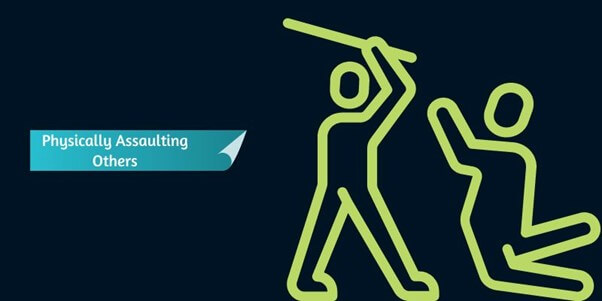
Physical assault is one of the most alarming signs of anger issues in a man. When anger escalates to the point of physical violence, it becomes not only a personal issue but also a legal and safety concern.
Men who struggle with anger may lash out physically, often over minor provocations. This behavior can have severe consequences, including injury to others, legal ramifications, and the potential loss of relationships.
Physical assault is a clear indicator that a man’s anger is out of control and requires immediate intervention. It’s crucial to recognize this sign early on and seek help, as unchecked aggression can lead to increasingly dangerous situations.
4. Lack of Patience
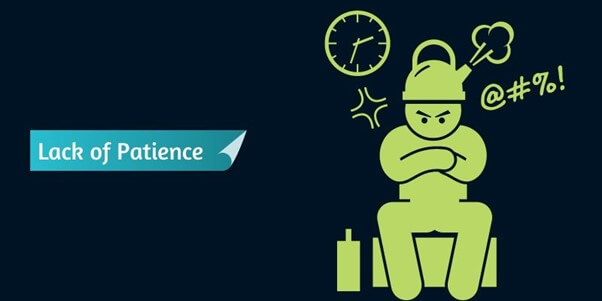
A lack of patience is another sign of anger issues in a man. Men with anger problems often have a short fuse, reacting with frustration or anger when things don’t go their way immediately.
This impatience can manifest in various situations, such as waiting in line, dealing with traffic, or interacting with loved ones.
The inability to tolerate delays or inconveniences can lead to frequent outbursts and strained relationships. Over time, this impatience can create a toxic environment where others feel pressured to meet unrealistic expectations to avoid conflict.
Recognizing a lack of patience as a sign of deeper anger issues is crucial, as it often indicates an underlying struggle with emotional regulation.
Addressing this impatience can help a man develop healthier coping mechanisms and improve his interactions with others.
5. People Are Walking on Eggshells
When people around a man feel like they’re constantly walking on eggshells, it’s a strong sign of anger issues. This phrase describes a situation where others are overly cautious in their interactions, fearing that anything they say or do might trigger an angry response.
This behavior usually develops when a man’s anger is unpredictable and intense, making those around him anxious and wary.
Over time, this environment can lead to significant emotional distress for everyone involved, causing strained relationships and a sense of isolation.
It also indicates that the man’s anger is not just affecting him but is having a negative impact on the well-being of those close to him.
Recognizing this sign is essential, as it highlights the broader effects of unmanaged anger and underscores the need for intervention to restore healthy dynamics.
6. Verbally Abusive
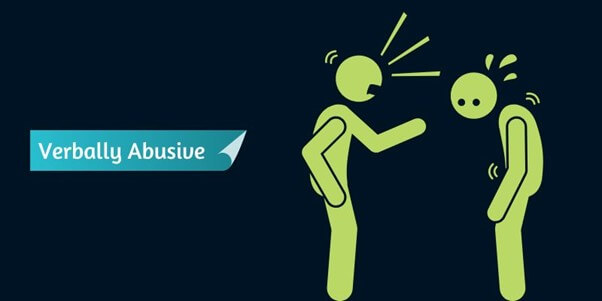
Verbal abuse is a significant sign of anger issues in a man. This behavior often manifests as yelling, name-calling, or making hurtful comments in moments of anger.
Unlike physical violence, verbal abuse can be more insidious, gradually eroding the self-esteem and emotional well-being of the victim.
Men who struggle with anger may use words as weapons, lashing out in ways that leave lasting emotional scars.
This pattern of behavior is not only damaging to relationships but also a clear indicator that the man cannot manage his anger healthily.
Over time, verbal abuse can lead to the breakdown of relationships, as those on the receiving end may eventually distance themselves to protect their mental health.
7. You Feel Angry Often
Feeling angry often is a clear sign of underlying anger issues in a man. While everyone experiences anger occasionally, frequent anger is a red flag that something deeper might be wrong.
This persistent anger might be triggered by minor annoyances or without apparent reason.
Over time, this constant state of anger can take a toll on a man’s mental and physical health, leading to stress-related conditions like hypertension, anxiety, or depression.
It can also strain relationships, as others may find it challenging to be around someone always on edge.
Recognizing that you often feel angry is an important step toward understanding that your anger might be more than a temporary emotion.
It’s a sign that you may need to explore the root causes of your anger and consider seeking help to manage it effectively.
8. Frequent Outbursts
Frequent outbursts are a common sign of anger issues in a man. These outbursts can range from shouting and yelling to more aggressive actions, such as slamming doors or throwing objects.
Often, these outbursts are disproportionate to the situation that triggered them, indicating that the man’s anger is not well-controlled. Such behavior can damage relationships, creating an atmosphere of fear and tension.
Loved ones may feel like they have to tread carefully to avoid setting off another outburst. Over time, this can lead to emotional distance and even the breakdown of relationships.
Frequent outbursts are not just a sign of poor anger management; they also point to deeper emotional struggles that need to be addressed.
Seeking professional help, such as therapy or anger management classes, can be crucial in learning how to control these outbursts and express emotions in a healthier way.
9. He Cannot Manage His Emotions

A man who cannot manage his emotions often exhibits signs of anger issues. Emotional regulation is key to maintaining healthy relationships and overall well-being, but when a man struggles to control his emotions, anger can quickly take over.
This inability to manage emotions results in sudden mood swings, overwhelming frustration, or intense feelings of anger that seem out of proportion to the situation.
When emotions are not managed properly, anger can become the default response to stress or conflict.
This can lead to frequent arguments, strained relationships, and even physical health problems due to chronic stress.
Recognizing that a man cannot manage his emotions is essential in identifying anger issues. It suggests a need for developing better coping strategies, possibly with the help of a men’s counseling therapist, to manage emotions more effectively and prevent anger from taking control.
10. He Destroys Items

When a man destroys items in moments of anger, it’s a clear sign of anger issues. This behavior, known as destructive anger, involves breaking or damaging objects to vent frustration or rage.
While it might provide temporary relief, it’s a harmful and unhealthy way to express anger. This behavior is often a sign that the man is struggling to manage his emotions and is using destruction as an outlet.
This leads to the loss of valuable items and creates an environment of fear and instability, especially if the destruction occurs in shared spaces like the home or workplace.
Over time, this behavior can escalate, leading to more severe forms of aggression.
11. Isolation

Isolation is a common sign of anger issues in a man. When a man frequently isolates himself, it may indicate that he is struggling with anger that he doesn’t know how to express or manage.
This self-imposed isolation can be a way to avoid confrontations or situations that might trigger his anger.
Over time, isolation can lead to feelings of loneliness, depression, and increased anger, creating a vicious cycle that is hard to break. Additionally, isolation can strain relationships, as loved ones may feel shut out or abandoned.
Recognizing isolation as a sign of anger issues is important, as it highlights the need for emotional support and healthy ways to cope with anger.
Encouraging open communication and seeking professional help can assist in breaking the cycle of isolation and fostering better emotional connections with others.
12. Makes You Revengeful
When anger makes a man feel revengeful, it signifies deeper anger issues. The desire for revenge usually stems from a sense of being wronged or hurt, and it can drive a man to plot ways to get back at those he believes are responsible.
This vengeful mindset is harmful not only to the person harboring it but also to those around him, as it perpetuates a cycle of negativity and conflict.
A man who feels revengeful is often consumed by his anger, unable to move past perceived slights or injustices.
This can lead to destructive behavior, damaged relationships, and even legal consequences if actions are taken in the name of revenge.
Recognizing this desire for revenge as a sign of anger issues is crucial for breaking free from anger and learning to let go of grudges in a healthier way.
13. Self-Harm

Self-harm is a serious and troubling sign of anger issues in a man. When a man turns his anger inward, he may engage in self-destructive behaviors such as cutting, burning, or other forms of self-injury.
This behavior often stems from a deep sense of frustration, helplessness, or self-loathing, where the man feels that hurting himself is the only way to cope with overwhelming emotions.
Self-harm is a cry for help and indicates that the man is struggling with emotional pain that he doesn’t know how to express or manage in healthier ways.
It’s crucial to recognize self-harm as a sign of severe anger and emotional distress, as it requires immediate intervention.
Seeking help from a mental health professional can provide the support needed to address the underlying issues and develop healthier coping strategies.
14. Your Anger Is Hurting Others
When your anger hurts others, it clearly shows unmanaged anger issues. This can manifest in various ways, such as verbal abuse, physical aggression, or emotional manipulation.
When anger is consistently directed outward, it can cause significant harm to those around you, damaging relationships and creating a toxic environment.
Loved ones may feel scared, hurt, or emotionally drained by the constant barrage of anger, leading to a breakdown in trust and communication.
Recognizing that your anger is hurting others is an important step toward taking responsibility for your actions and understanding the impact of your behavior. It highlights the need for better anger management strategies to prevent further harm.
15. Becomes Inappropriately Angry
When a man becomes inappropriately angry, it’s a sign that he may have underlying anger issues. This behavior is characterized by disproportionate anger toward the situation at hand.
For instance, a minor inconvenience or a simple misunderstanding might trigger an intense over-the-top reaction. This inappropriate anger can create awkward or hostile situations, making others feel confused, threatened, or alienated.
Such reactions often indicate that the man is struggling with unresolved issues or emotional stress that is causing him to lash out in situations where it’s not warranted.
Over time, this pattern of behavior can damage relationships, reputation, and overall well-being.
16. Being Excessively Critical or Negative
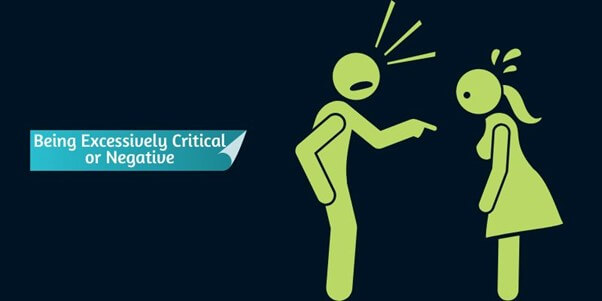
Being excessively critical or negative is another sign of anger issues in a man. This behavior involves constantly finding faults in others, situations, or oneself, often without any constructive purpose.
Men with anger issues may use criticism to express their frustration or dissatisfaction, projecting their inner turmoil onto those around them.
This negativity can create a toxic environment, making others feel demoralized, undervalued, and unable to meet expectations.
Over time, being excessively critical can strain relationships, as people may begin to distance themselves to avoid the constant negativity. It can also reflect a deeper unhappiness or unresolved anger within the man himself.
17. Easily Gets Irritated
When a man easily gets irritated, it can be a sign of struggling with anger issues. This irritation may arise from the smallest triggers, such as everyday inconveniences, minor mistakes, or even the actions of others that he perceives as annoying.
This frequent irritability indicates that the man’s threshold for frustration is low, and his anger is always simmering beneath the surface.
Over time, this constant irritation can make it difficult for him to be around, as others may feel like they have to walk on eggshells to avoid setting him off.
Additionally, this ongoing irritability can contribute to stress and strain relationships, as loved ones may feel worn down by the man’s unpredictable mood swings.
18. Frustration

Frustration is a common sign of anger issues in a man, especially when it becomes a frequent or overwhelming feeling.
When a man is consistently frustrated, it often indicates that he feels stuck, powerless, or unable to achieve his goals.
This frustration can quickly turn into anger, particularly if the man doesn’t have healthy ways to cope with his obstacles or setbacks.
This chronic frustration can lead to a buildup of negative emotions, causing him to lash out at others or internalize his anger, leading to stress and anxiety. Over time, this can create a cycle of frustration and anger that is hard to break.
19. Guilt

Guilt can be a complex sign of anger issues in a man. While guilt is a natural emotion that occurs when someone feels they’ve done something wrong, it can become problematic when it’s tied to unresolved anger.
A man with anger issues might feel guilty about his angry outbursts, harsh words, or aggressive actions, leading to a cycle of anger, guilt, and further anger.
This guilt can weigh heavily on him, contributing to feelings of shame, self-loathing, and even depression.
In some cases, guilt may also fuel further anger, as the man becomes frustrated with himself for being unable to control his emotions.
20. He Attempts to Hit You

If a man attempts to hit you, it’s a severe sign of anger issues that cannot be ignored. This aggressive behavior indicates that his anger has escalated to a point where he is willing to physically harm others, which is a clear red flag.
Even if the attempt doesn’t result in actual physical contact, the mere act of trying to hit someone demonstrates a lack of control over his emotions and an inclination toward violence.
This behavior is dangerous and a strong indicator of deep-seated issues that require immediate intervention.
It’s recognized as a sign of serious anger problems, and prioritizing your safety is crucial in such situations; seeking help from law enforcement or support services is essential, as this behavior is a form of abuse that can have lasting physical and emotional consequences.
21. He Bad Mouths You
When a man bad mouths you, it’s a sign of underlying anger issues that are being expressed through verbal aggression.
Bad mouthing involves making negative, hurtful, or derogatory comments about you, often intending to undermine your self-esteem or reputation. This behavior is a way for the man to vent his anger and frustration, but it’s damaging.
It can have long-lasting effects on the relationship. Whether these comments are made directly to you or behind your back, they reflect unresolved anger that the man cannot manage constructively.
Over time, this verbal abuse can erode trust and respect, creating a toxic dynamic that is harmful to both parties.
22. He Gets Angry Over Past Issues
When a man frequently gets angry over past issues, it’s a sign that he may be holding onto unresolved anger or resentment.
This behavior involves revisiting old arguments, grievances, or mistakes and reacting angrily, even if the issues have been settled or are no longer relevant.
This tendency to dwell on the past can create tension and conflict, preventing the man and those around him from moving forward.
It also indicates that the man may struggle with forgiveness toward others or himself, which can perpetuate a cycle of anger and bitterness.
Seeking therapy or counseling can help address these unresolved emotions and learn to manage them more effectively.
23. He Gets Into Fights
A man who frequently gets into fights is displaying a clear sign of anger issues. This behavior typically involves physical altercations or heated arguments that escalate into confrontations.
The tendency to get into fights suggests that the man struggles to control anger and may use aggression to assert dominance or release pent-up frustration.
Frequent fighting not only poses a risk to his safety but also endangers others, leading to potential legal consequences and damage to relationships.
It can also indicate underlying issues, such as unresolved trauma, insecurity, or a lack of healthy coping mechanisms.
24. He Gives You the Wrong Advice

When a man gives you the wrong advice, particularly out of anger, it can be a sign of deeper anger issues.
This behavior might involve intentionally misleading you, offering unhelpful or harmful advice, or simply not considering your best interests due to his emotional state.
The motivation behind this can vary, sometimes it’s a passive-aggressive way of expressing his anger, or it might stem from a desire to sabotage or control the situation.
Giving wrong advice can erode trust, as it shows that the man’s anger influences his ability to be supportive or rational. Over time, this behavior can lead to confusion, poor decisions, and damaged relationships.
How Do You Deal with a Man Who Has Anger Issues?
Dealing with a man who has anger issues can be challenging and emotionally draining. It is essential to approach the situation with care, understanding, and clear boundaries.
Here are effective strategies that can help you control the situation.
-
- Recognize the Signs: Identify the signs and triggers of anger issues to understand the extent of the problem. Anger assessment can be a great tool here as it helps the professionals find the clear picture.
-
- Stay Calm: Approach the situation calmly, avoiding confrontation or escalation.
-
- Communicate Openly: Express your concerns non-judgmentally, explaining how his anger affects you and the relationship.
-
- Set Boundaries: Clearly define what behavior is unacceptable and what consequences will follow if boundaries are crossed.
-
- Encourage Professional Help: Suggest therapy or Men Counseling Therapist to help him address the underlying issues.
-
- Offer Support: Be supportive, but clarify that he must take responsibility for managing his anger.
-
- Protect Yourself: Prioritize your safety and well-being. If the situation becomes dangerous, seek help or remove yourself from the environment.
-
- Avoid Blame: Focus on the behavior, not the person, to prevent defensiveness and encourage positive change.
-
- Be Patient: Change takes time; be patient, but recognize when to step away if progress isn’t made.
Frequently Asked Questions
What Are Extreme Anger Issues in Adults?
Extreme anger issues in adults involve frequent intense outbursts that are unrelated to the situation. This level of anger often leads to destructive behavior, physical aggression, or verbal abuse, indicating a severe inability to manage emotions.
What Is Anger a Symptom Of?
Anger can be a symptom of underlying issues such as stress, anxiety, depression, unresolved trauma, post-traumatic stress disorder (PTSD), or other mental health disorders. It often reflects deeper emotional pain or a lack of coping mechanisms.
What Causes Rage in a Person?
Rage in a person can be caused by factors such as chronic stress, unresolved trauma, mental health conditions, or feelings of powerlessness and frustration. It often arises from an inability to express or process emotions healthily.
How Do Men Act When Angry?
Men may exhibit behaviors such as yelling, physical aggression, withdrawal, or becoming overly critical when angry. They might also engage in destructive actions or display irritability and frustration.
Why Do Guys Get Irritated So Easily?
Guys may get irritated easily due to stress, unmet expectations, or difficulty managing emotions. Hormonal imbalances, fatigue, or underlying mental health issues can also contribute to heightened irritability.
Conclusion
Dealing with a man who has anger issues requires a perfect balance of empathy, communication, and self-care.
Recognizing the signs of anger issues in a man is the first step in addressing the problem. It is equally important to maintain clear boundaries and prioritize your well-being.
Encourage open conversations about the impact of his anger and suggest professional help like men’s therapy or anger management classes to address the underlying issues.
Change takes time, and while support is crucial, the responsibility to manage and overcome anger ultimately lies with him.
If his behavior becomes harmful or threatens your safety, it’s essential to seek help or distance yourself from the situation.


5 Responses